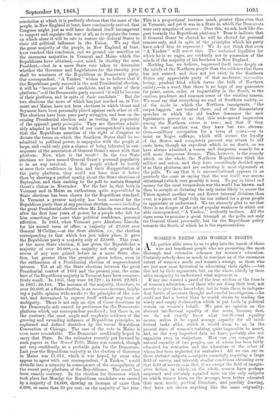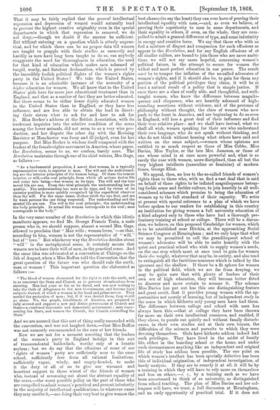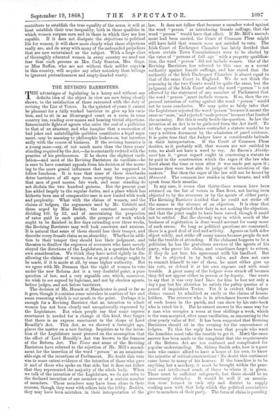WOMEN'S NEEDS AND WOMEN'S RIGHTS.
ALLL parties alike seem to us to play into the hands of those wise and beneficent people who are promoting the most thorough and extensive schemes for women's education. Certainly nobody does so much to convince us of the enormous extent of women's needs and women's wrongs, as those who are just now most hysterical in advocating their rights ;—but this not by their arguments, but, on the whole, chiefly by their utter incapacity to understand what argument is.
If any one wanted a proof of the true wisdom of the friends of women's education,—of those who are doing their best, not merely to give them knowledge, but to train them in indepen- dent habits of accurate thought and careful investigation,—he could not find a better than he would obtain by reading the windy and empty declamation which is put forth by political women on women's behalf. We pass no opinion on the abstract intellectual equality of the sexes, because, first, we do not exactly know what intellectual equality means, unless it be equal average capacity for all intel- lectual tasks alike, which it would seem to us, in the present state of women's training, quite impossible to assert, and, on the very imperfect data we have, probably also not sagacious even to conjecture. How can you compare the natural capacity of two peoples, one of whom has been fairly educated for centuries, and the education of the other of whom has been neglected for centuries ? All we can say on these abstract subjects,—subjects essentially requiring a large field of survey, and tolerably similar conditions obtaining over that field of survey,—is that, if we except the field of imagin- ative fiction, in which, on the whole, women have perhaps surpassed and certainly equalled men, on the only subjects on which women have, on the average, been better educated than men, music, poetical literature, and possibly drawings they have not shown anything like the same originality.
That it may be fairly replied that the general intellectual repression and depression of wometi would naturally tend to prevent the highest creative originality even in the special departments in which that repression is removed, we do not deny,—though we doubt if the answer be sufficient.
But without entering on a question which is utterly unprac- tical, and for which there can be no proper data till women are taught to grapple with their studies as earnestly and hardily as men have long been taught to do so, can anybody exaggerate the need for thoroughness in education, the need for that kind of education which makes men ashamed of turgid, wordy, and flatulent declamation, which is proved by the incredibly foolish political flights of the women's rights party in the United States ? We take the United States, because it is an admirable instance of the necessity of a higher education for women. We all know that in the United States' girls have far more just educational treatment than in England, and that as a matter of fact they are better educated. But there seems to be either fewer highly educated women in the United States than in England, or they have less influence, and are less able to obtain the lead in direct- ing their sisters what to ask for and how to ask for it. Miss Becker's address at the British Association, with its irrelevant inquiries into the relative condition of the sexes among the lower animals, did not seem to us a very wise pro- duction, and her dispute the other day with the Revising Barrister at Manchester was fussy and ill-judged, even for her purpose. But Miss Becker is wisdom itself compared with the leaders of the female-rights movement in America, whose paper, the Revolution, seems to us, we confess, barely sane. The Revolution maintains through one of its chief writers, Mrs. Gage, as follows :—
" As a fundamental proposition, I assert that woman, in a typically representative view, is superior to man. The will and the understand- ing are the interior principles of the human being. Of these the inmost iuterior, or will,—the soul principle, from which all actions derive life and come into being,—has woman as its type. The will and the true moral life are one. From this vital principle the understanding has its quality. The understanding has man as its type, and by virtue of its exterior position is more quickly recognized by the superficial observer than the will. For the same cause, clothes catch the eye first, and are by weak persons the one thing respected. The understanding and the mental life are one. The will is the soul principle ; the understanding the body principle. In actual life woman corresponds to the soul ; man corresponds to tho body."
In the very same number of the Revolution in which this idiotic manifesto appears, we find Mr. George Francis Train, a male person who is, we should suppose, almost a second Mrs. Gage, allowed to proclaim that" Man wills ; woman loves,"—so that, according to him, woman is not the representative of "will," but of " love." But whichever way the Revolution decides about " will " in the metaphysical sense, it certainly means that women are to have their will of men, in the practical sense. And the same idea was advocated at a convention at Chicago on the 5th of August, when a Miss Buffon told the Convention that the great question of the future was who should rule the earth, man or woman ? This important question she elaborated as follows :—
" The blood of women clamoured for the right to rule the earth, and to so construct the State and Church as to prevent abominations from entering. Man had gone as far as he dared, and was now waiting to take the Oath of Allegiance to the now ts'overnment, and become loyal subjects thereof, of which a woman is the head and prime mover. They needed the protection of men ; but, if it was denied them, they would go alone. We, the people, inhabitants of America, are prepared to rally around and support a new and divine government of Church and State—a combined theocratic and democratic government ; men repre- senting the State, and women the Church, the Church controlling the State."
And we are assured that this sort of thing really succeeded with the convention, and was not laughed down,—that Miss Buffon was not earnestly recommended to the care of her friends.
Now we are not for a moment asserting that the leaders of the women's party in England indulge in this sort of transcendental balderdash, worthy only of a lunatic asylum ; but we do say that the effusions of some of our rights of women' party are sufficiently near to the same school, sufficiently free from all rational limitations, sufficiently vague, windy, and empty-headed, to make it the duty of all of us to give our warmest and heartiest support to those wisest of the friends of women who, instead of screaming out about the abstract equality of the sexes,—the worst possible policy on the part of those who are compelled to admit women's practical and present inferiority in the majority of intellectual qualifications, to whatever cause they may ascribe it,—are doing their very best to give women the best chance (to say the least) they can ever have of proving their intellectual equality with men,—and, as even we believe, of proving their superiority to men in some departments, and their equality in others, if even, on the whole, they are com- pelled to admit a general difference of type, and some inferiority in energy and creative force. We say that those who with us feel a mixture of disgust and compassion for such effusions as appear in the Revolution, and for any English effusions of at all similar calibre, are bound to join those who are more ambi- tious, we will not say more hopeful, concerning women's political future, in the attempt to secure for women the widest and most perfect education in our power. The result must be to temper the inflation of the so-called advocates of women's rights, and if it should also be, to gain for them any portion of the political privileges they claim, it will be at least a natural result of a policy that is simple justice. If once there are a class of really able, and thoughtful, and well- taught women, who know the difference between magnilo- quence and eloquence, who are heartily ashamed of high- sounding assertions without evidence, and of the pretence of philosophy without thought, the class of women who now push to the front in America, and are beginning to do so even in England, will lose a great deal of their influence and find their true relative place : and we shall have instead, what we shall all wish, women speaking for their sex who understand their own language, who do not speak without thinking, and who do not think without hearing what others have said and written on the same subject,—women whose opinions are entitled to as much respect as those of Miss Cobbe, Miss Davies, Miss Taylor, or the late Mrs. Jameson, or those of one whose mind is at once more powerful and, what is so rarely the case with women, more disciplined, than all but the very highest intellects (masculine or feminine) of modern times, George Eliot.
We appeal, then, no less to the so-called friends of women's rights than to those who, with us, find a vast deal that is said on behalf of those rights to be inflated magniloquence betray- ing feeble sense and feebler culture, to join heartily in all well- considered schemes which promise to bring the education of women up to the full standard of their capacity. We write at present with special reference to a plan of which we have before spoken to our readers for establishing in this country an institution for giving women a full university education of a kind adapted only to those who have had a thorough pre- liminary training at school or college. There will be a discus- sion, we believe, on this proposed Cambridge for women, which is to be established near Hitchin, at the approaching Social Science Congress at Birmingham ; and we only hope that what we may be permitted to call the grandiloquent school of women's advocates will be able to unite heartily with the quiet and practical school who wish to supply women's needs, on the one step which must at once tend to gain for women their due weight, whatever that maybe, in society, and also tend to extinguish all the factitious nonsense which is talked by the ignorant and the shallow. If there be a fit sphere for women in the political field, which we are far from denying, we may be quite sure that with plenty of leaders of their own sex of high education, they will become better fitted to discover and more certain to assume it. The scheme Miss Davies has put out has this one distinguishing feature and great merit, that it provides -young women with the op- portunities not merely of learning, but of independent study in the sense in which hitherto only young men have had them. The difference between college and school with men has always been this,—that at college they have been thrown far more on their own intellectual resources, and enabled, if they chose, to puzzle out quietly and without family disturb- ances, in their own studies and at their own leisure, the difficulties of the sciences and pursuits to which they were devoting themselves. Girls have hitherto seldom indeed had such privileges. They have lived in the midst of family life, either in the boarding school or the home, and under such circumstances anything like an independent and original life of study has seldom been possible. The one point on which women's intellect has been specially defective has been this of individual origination, of independent investigation, of hardy analysis. If they are to remedy it at all, it will be by a training in which they will have to rely more on themselves and less on others,—i. e., by a training such as we have been accustomed to think of as university, as distinguished from school teaching. The plan of Miss Davies and her col- leagues will have, we trust, a full discussion at Birmingham, and an early opportunity of practical trial. If it does not
contribute to establish the true equality of the sexes, it will at least establish their true inequality, both in those qualities in which women surpass men and in those in which they are less capable. If it does not dissipate the objections to political life for women, it will show more clearly what these objections really are, and do away with many of the unfounded prejudices that are now entertained on the subject. With a large class of thoroughly educated women in every country we need not fear that such persons as Mrs. Cady Stanton, Mrs. Gage, or Miss Buffon, who are not without their milder copyists in this country, will acquire any other notoriety than belongs to ignorant pretentiousness and empty-headed vanity.
































 Previous page
Previous page